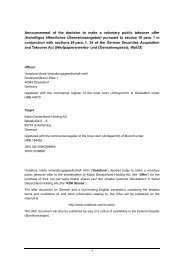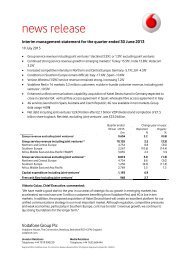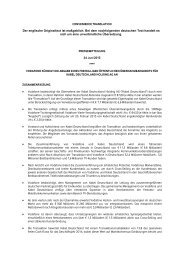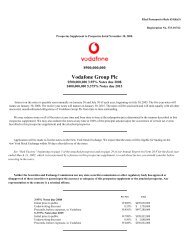Create successful ePaper yourself
Turn your PDF publications into a flip-book with our unique Google optimized e-Paper software.
Moving the debate forward • The Policy Paper Series • Number 8 • April 2008<br />
Finally, even if we were to consider the prices on call<br />
termination as a potential reflection of market power, it has<br />
to be highlighted that excessive pricing is not the issue here,<br />
since this has never been contemplated in the allegations of<br />
the Spanish competition authorities.<br />
Leveraging market power into downstream markets<br />
through predation, bundling or foreclosure<br />
It is certainly the case that predation, bundling and<br />
foreclosure strategies are practices which could be anticompetitive<br />
in telephony markets. However, they are not<br />
present in this particular case.<br />
Very low prices for certain services could under certain<br />
circumstances constitute a predation strategy, whereby<br />
a company with a very large share of the market attempts<br />
to expel competitors from the industry. This could happen<br />
in telecommunications in extreme cases, since the<br />
characteristics of the industry (both on the supply and the<br />
demand side of the market) could lead to a tipping of the<br />
market. However, the case presented here is not a predation<br />
case, since <strong>Vodafone</strong> has a small overall market share in the<br />
industry. This is the situation in particular in the fixed-tomobile<br />
segment and in the wider fixed market (see table 2<br />
below). Note also, that the narrowly defined fixed to mobile<br />
market is precisely the focus of the complaint on the alleged<br />
anti-competitive behaviour of <strong>Vodafone</strong>.<br />
In mobile origination and related mobile services the market<br />
share is larger (see table 1 above), but far less than the one that<br />
could allow any tipping of the market. Moreover, predation is<br />
a strategy which is unlikely to be successful in this industry.<br />
In the event that a competitor is expelled from the market<br />
(unlikely as TME and Amena are strong competitors), the<br />
second stage of the predation strategy involves a price<br />
increase, which is likely to trigger new entry into the industry,<br />
whether of fixed operators or of mobile operators. In this<br />
last case, in the event that a competitor runs into financial<br />
difficulties, this may lead to the exit of a rival, but need not<br />
lead to a reduction of the installed capacity since the mobile<br />
licence and the network would not disappear, but in all<br />
likelihood be bought by a new owner at a fraction of its cost,<br />
thereby creating a stronger new competitor.<br />
Bundling could also be a problem in this industry if a<br />
company is both an operator of fixed and mobile telephony,<br />
but it requires strong, if not dominant, positions in both<br />
markets or a virtual monopoly in one. If the company has<br />
Table 2. <strong>Vodafone</strong> market share in the fixed markets<br />
On-net Pricing in Mobile<br />
a very dominant position in fixed telephony, bundling fixed<br />
and mobile services could be a practice which excludes<br />
competitors from the mobile market, since the dominant<br />
firm could leverage its position in one market and extend it<br />
in the other through the offer of products which could not<br />
be replicated by competitors. The bundling problem is not<br />
an issue in this case, however, since <strong>Vodafone</strong> does not have<br />
a large market share in any of the two markets involved and<br />
any attempt to bundle services can be replicated easily by<br />
other mobile operators.<br />
Foreclosure is another potential problem whenever a<br />
company that operates a network tries to increase the<br />
costs of rivals through its pricing of access. It must be<br />
noted, though, that in the case of call termination in the<br />
Spanish market, instead of increasing prices had dropped<br />
by 15% between 2000 and 2002, when price regulation was<br />
introduced. It is true, however, that differential termination<br />
prices could erode the competitive position of rivals in<br />
related markets. If this were to be the case with regards to<br />
the <strong>Vodafone</strong> pricing practices, we should observe that the<br />
market shares of the affected parties (fixed network operators<br />
in the fixed to mobile segment and possibly the wider fixed<br />
market), should have been declining while <strong>Vodafone</strong>’s share<br />
is increasing. This has not been the case as is evident from<br />
<strong>Vodafone</strong>’s very small share of fixed to mobile traffic, and<br />
therefore, it appears that the company is not attempting or<br />
able to increase (an already low) market share in the fixed to<br />
mobile segment of the industry (see table 2 below). The only<br />
explanation must be that there has been no such leverage<br />
(or perhaps that there was no dominance in the first place,<br />
and therefore no actions that were trying to protect or extend<br />
dominance). 5 Finally, even if we were to observe an increase in<br />
the market share of <strong>Vodafone</strong> in the fixed to mobile segment<br />
of the industry, this need not be the result of restrictive<br />
practices and could well be the outcome of procompetitive<br />
behaviour, as we will see next.<br />
Competitive outcome<br />
The practice under investigation could also be the outcome<br />
of an attempt by the company to improve efficiency in the<br />
face of market pressures from competitors and customers.<br />
From the analysis of the evolution of the market, it appears<br />
that this is the case here. This product is demand driven –<br />
corporate customers want the economics of a private network<br />
(lower ongoing variable costs in return for higher upfront or<br />
Full Market <strong>Vodafone</strong> <strong>Vodafone</strong><br />
Year 2002 (1) (2) Market Share<br />
Lines (Thousands) Fixed Lines 17.641,00 125,91 0,71%<br />
Corporate Fixed Lines 2.998,00 82,52 2,75%<br />
Minutes (Million) Fixed Minutes 126.577,00 313,89 0,25%<br />
Corporate Fixed Minutes 52.149,72 115,95 0,22%<br />
F2M Minutes 7.564,05 32,46 0,43%<br />
Corporate F2M Minutes 3.116,39 20,96 0,67%<br />
Notes:<br />
General: Indirect (including preselection) and direct access included.<br />
(1) Source: CMT 2002 Report.<br />
(2) Source: <strong>Vodafone</strong> answer to CMT request for the annual report elaboration.<br />
9

















